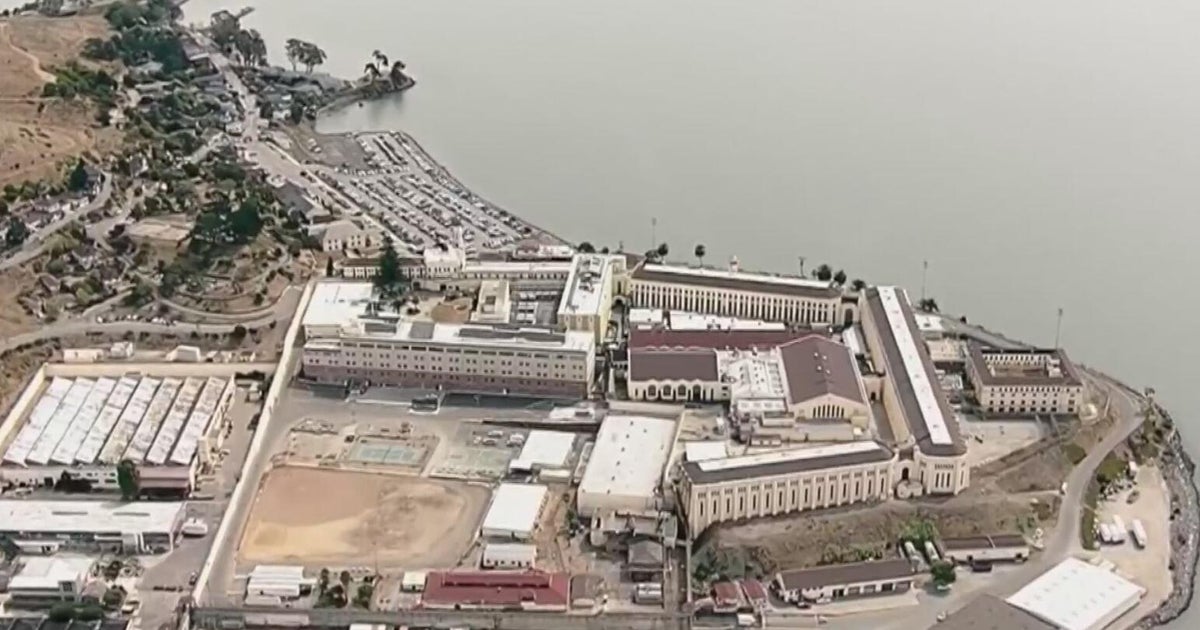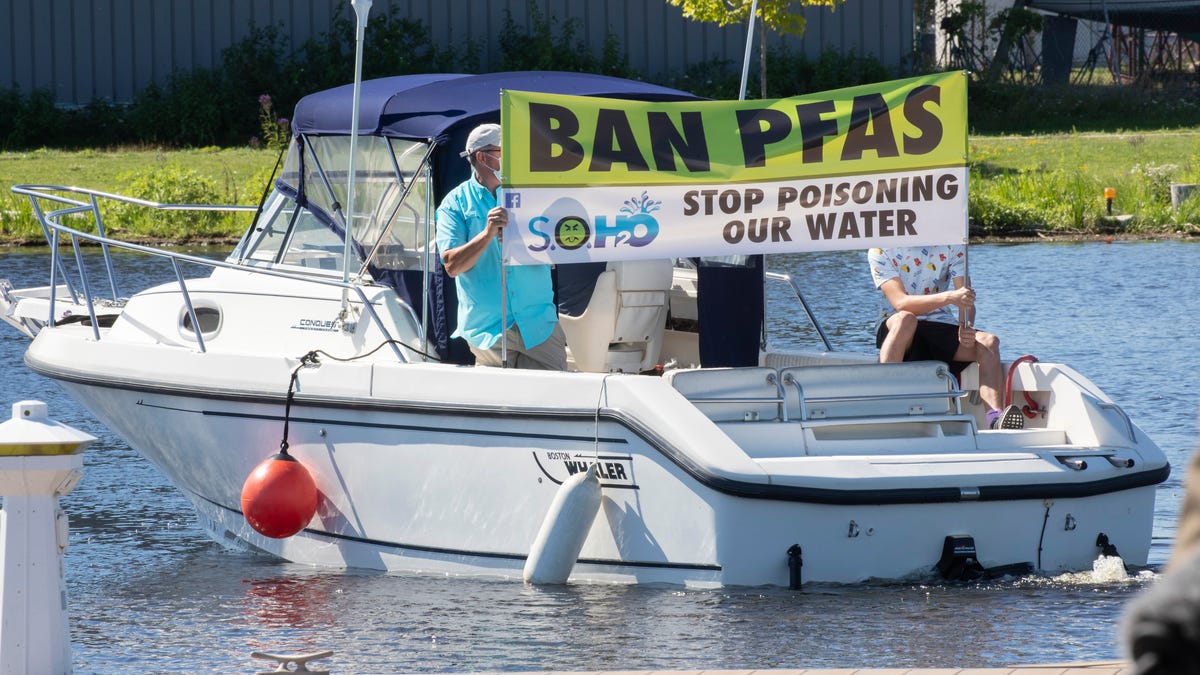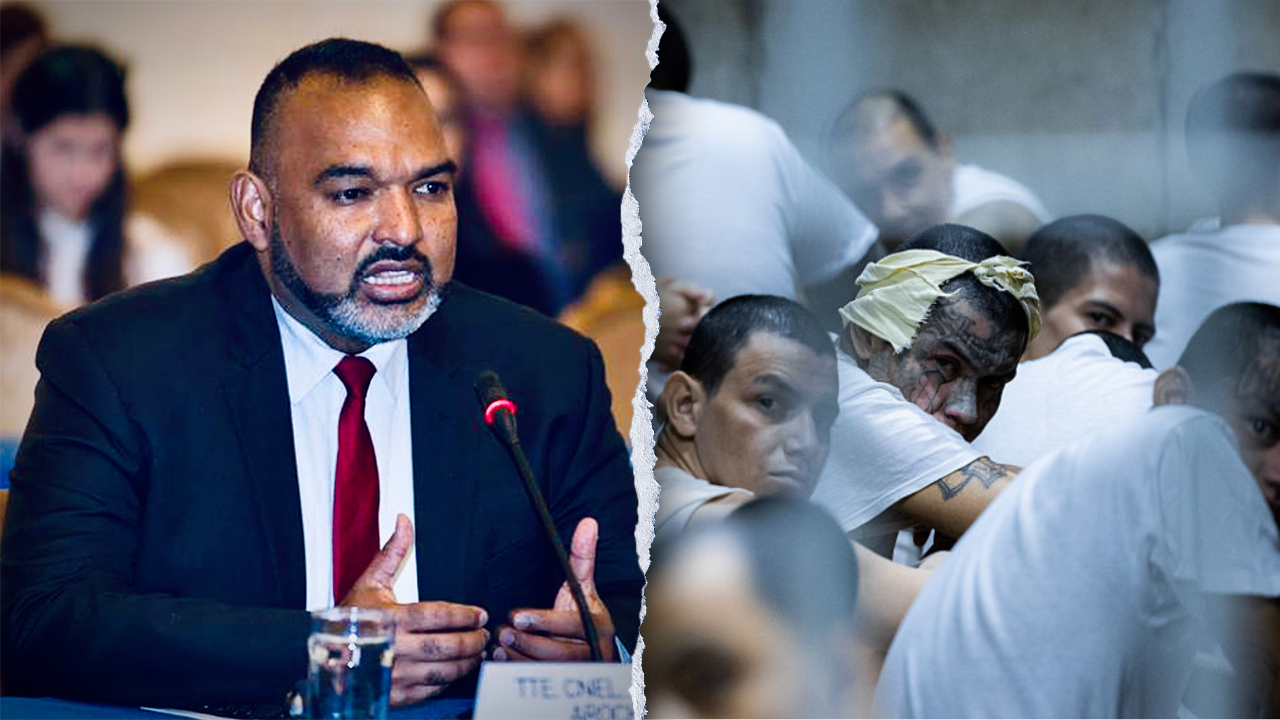Governor Gavin Newsom unveils an expansion of California’s film and TV tax credit program in October 2024.
Getty Images
California
Southern California water company to get $21 million to transform Delta island

Grazing cattle on an island in the central Sacramento-San Joaquin River Delta could soon make way for Contra Costa County’s first rice fields and a mosaic of restored wetlands now that its owner has received a $20.9 million state grant.
The company plans to restore nearly 5,000 acres of Webb Tract, including 3,000 in wetlands, 1,500 in rice fields and the rest in other habitats, such as grasslands and scrub.
The Sacramento-San Joaquin Delta Conservancy Board recently approved funding for the restoration work at Webb Tract, which the Metropolitan Water District of Southern California proposed on land it purchased along with three other islands – Bouldin, Bacon and Holland – for $175 million in 2016. At the time, the district said it could use them to store construction equipment, but critics warned that it would make it easier for the governor’s proposed — and later scrapped — California Water Fix project to send more water to Southern California, with twin tunnels to be built smack in the islands’ pathway.
The new plan to turn one island into wetland and rice fields, however, seemed to get a measure of support all around.
“This is an excellent opportunity to demonstrate how we can manage the deeply subsided islands of the Delta in a way that stops subsidence and related carbon emissions, maintains agriculture, provides habitat benefits, and – most importantly – improves the long-term economic viability and resilience of the islands,” Delta Conservancy Executive Officer Campbell Ingram said in a statement.
The grant for the project comes from the state Amended Budget Act of 2022, which provided the Delta Conservancy with $36 million for projects that support restoration, conservation and climate resilience for wetlands. The Metropolitan Water District of Southern California also will provide $4.4 million in in-kind staff services for planning the project.
Reached only by ferry, Webb Tract is north of Bethel Island and southwest of Bouldin Island. Historically, it had been used to farm corn but is now being leased for cattle grazing. Over the years it has sunk deeply, or subsided, something that happened in many Delta areas as native wetlands were drained in the 19th century for agriculture, resulting in the lowering of the land elevation.
But Lauren Damon, ecological restoration and climate adaptation projects supervisor for the Delta Conservancy, said the Metropolitan project seeks to slow that subsidence by restoring nearly all of Webb Tract.
Transforming the island into wetlands could slow the sinking and may help trap carbon dioxide, reducing greenhouse gas emissions that contribute to climate change, according to Metropolitan officials and scientists who study the issues.
“The primary goal of this project is to halt organic soil subsidence and to reduce greenhouse gas emissions,” Damon told the Delta Conservancy board at its May 24 meeting.
The Delta has more than 150,000 acres of deeply subsided or sinking islands that are a contributor to climate change as they produce greenhouse gases and pose flooding risks to communities and agricultural lands in the Delta as sea levels rise, she said.
“Each year the islands continue to oxidize and subside, resulting in increased risk for climate change in play,” Damon said. “This project will achieve its goals by realigning the landscape and converting pasture into restored wetlands and rice crops.”
Damon said planning is already underway for the two-phase project, including designing and permitting followed by construction, which will be over a three-year period, according to company documentation. She also noted that the agency received letters supporting the project from residents, agricultural and environmental organizations, tribal leaders, local reclamation districts and water districts.

“Successful completion of this project will serve as a showcase for other landowners, demonstrating rice and wetlands as mutually beneficial alternatives to the current agricultural practices,” Damon said.
Some board members, however, wanted to make sure the Southern California water company did not use the island to mitigate the proposed Delta Tunnel Project that would divert water from the Sacramento River into a nearby 45-mile tunnel to more easily transport it to Southern California.
But Ingram assured board members that was not possible.
“Essentially, with our public money, we can’t pay for anyone else’s mitigation,” he said. “We have a strong firewall.”
Ingram also noted that the grant monies have a short timeline and must all be obligated by 2025, making the large grant “reasonable.”
“It helps move that money quickly and justifies more in the future,” he said. “ And, it helps so that we can actually step up the pace and scale of restoration that we need to achieve statewide objectives for biodiversity and nature-based solutions and natural working lands.”
Ingram explained that dry agriculture is causing oxidation and continued subsidence of lands like Webb Tract and any “wet” agriculture you can do (like rice fields) stops subsidence and carbon emissions.
“So we’re looking at it as a way to keep agriculture viable and actually increase the economic value (with rice), but also really focus on stopping the subsidence and the carbon emissions,” he said.
Board member Diane Burgis of Oakley said that while Contra Costa County supported Phase 1, there were many other projects that had hoped to apply for the Phase 2 monies, which now will go to the Webb Tract project.
“I have concerns about committing so much money to a project when we don’t even have the project yet,” she said, noting other smaller projects were “ready to go.”
Ingram explained the money must be spent by 2027.
“These are large, complex projects. … They take many, many years to move forward,” he said. So we’re trying to compress the obligation process locking the funding for the project, as well as the timeline to design and implement it as quickly as possible.”
The board later unanimously approved the funding.
“This project will significantly improve the sustainability of Webb Tract in multiple ways and help develop methods and strategies that can potentially be applied throughout the Delta,” Metropolitan General Manager Adel Hagekhalil later said in a statement. “We anticipate it will help reverse ongoing subsidence, reduce greenhouse gas emissions and create new critical habitat, while also supporting the studies that can lead to carbon sequestration opportunities and the development of sustainable agriculture.”

California
California bill proposes pilot program for single-occupancy prison cells

In a unique alliance, prisoners at San Quentin Rehabilitation Center and California district attorneys are championing legislation to reform California’s prison system by introducing a pilot program for single-occupancy cells.
Ken Oliver, who spent nearly 24 years incarcerated — eight of those in solitary confinement — turned that trying time alone, in a cell the size of a closet, into an opportunity for self-improvement.
“I literally turned my cell into a law library and studied the law for four years,” Oliver recalled. “Had I had a cellmate, I would not have been able to do that.”
AB 1140, sponsored by Assemblymember Damon Connolly, whose district includes San Quentin, mandates the California Department of Corrections and Rehabilitation (CDCR) to implement a pilot program for single-occupancy cells by January 1, 2027. If approved, the program will designate four adult prison facilities where at least 10% of the incarcerated population will be housed in single-occupancy cells.
The bill emphasizes the importance of restorative sleep and reduced stress in promoting rehabilitation. Studies cited in the legislation highlight that overcrowded conditions can lead to increased stress and health issues among inmates.
“It causes less stress,” Oliver says of single-occupancy living for those incarcerated. “That actually soothes me a little bit, calms me down, allows me to go to things in a different perspective. When I’m forced to navigate that with another person, I’m actually restricting a piece of myself, or repressing a piece of myself because there’s another human being in close proximity that if I don’t do that, may cause violence, may cause death, which has happened in multiple cases inside the Department of Corrections.”
San Francisco District Attorney Brooke Jenkins leads regular symposiums with inmates, whom she calls residents, at San Quentin. She worked alongside those serving time to craft the legislation.
“It is probably the most unimaginable partnership between a district attorney and inmates in a prison,” she told CBS News Bay Area. “They have an overwhelming desire for us as prosecutors to understand the road that got them here. They also want to give back so that other people, other kids, youth, young people, don’t end up in the same place.”
Vincent O’Bannon, who collaborated with Jenkins on the legislation during his 15-year tenure at San Quentin, emphasized the potential benefits of single-occupancy cells.
“Just being alone takes a great weight off of you,” he stated. “When you can go to a cell and know you don’t have to share it with anyone else, and you can just walk in and relax. It makes a difference.”
As Oliver reflects on his past and the potential impact of AB 1140, he remains hopeful.
“Never fun to go back into the dungeon,” he said, referring to his time in confinement.
Yet, he believes that the system that once confined him is now taking steps to enhance public safety and rehabilitation both inside and outside prison walls.
The state Assembly is expected to vote on the legislation next Tuesday. If approved, it will go to a vote in the Senate.
California
California dad opens fire as high school boys flee after egging his home, prosecutors say

A San Mateo man is facing multiple felony charges after he allegedly opened fire at an SUV carrying three high school boys who had poured oil over his porch and egged his home, authorities said.
Craig Miceli, 54, told police officers that his daughter had been a victim of constant bullying at her high school and that he was infuriated by the pranksters’ antics, according to the San Mateo County District Attorney’s Office.
Prosecutors said the boys — two of them age 16 and another 17 — targeted the San Mateo home of a female classmate they did not like from Hillsdale High School.
First they spread oil over Miceli’s front porch on Friday. Then they returned in the early hours of Sunday morning and each threw an egg at his home.
Miceli fought yolk with lead, allegedly firing two shots at the boys’ SUV, one of which struck the panel above the front passenger side wheel, according to the D.A.’s Office.
He told police officers that he was already upset about having to spend time cleaning oil off his porch prior to the egging incident, so he angrily grabbed his gun and fired it at the boys’ car tires, prosecutors said. Miceli said he then dumped the weapon into Water Dog Lake.
Police later obtained a search warrant and recovered an illegal automatic rifle and several types of ammunition from his home.
Miceli was charged with three counts of assault with a firearm, one count of shooting at an occupied vehicle and two counts related to an unlawful assault weapon. He was arraigned in San Mateo Superior Court on Tuesday and pleaded not guilty to all charges.
The court issued a protective order banning Miceli from contacting the teenagers. His bail was set at $25,000, and he is due back in court for a preliminary hearing on June 9, according to the D.A.’s Office.
California
California Is Doubling Its Film Incentive, but It May Be Too Late to Stop Runaway Production

“Mad Men” was set in 1960s New York, but it was mostly filmed at a studio just west of downtown Los Angeles. Sienna DeGovia was one of hundreds of people who worked on the show. Someone needed to re-create the food of that era, like savory Jell-Os and the carrots cut into one-inch cubes that used to be served on airplanes, and that’s what she does — she’s a food stylist. She started as an assistant 25 years ago and after learning the craft, became a lead stylist.
Los Angeles is full of weird jobs like that — or at least it used to be. But content production peaked in 2022, and the world’s entertainment capital has since been battered by a global contraction.
“The beginning of 2024, everything fell off a cliff,” DeGovia says. “I called all my old mentors and begged to be taken on as an assistant. I never had to do that in 20 years.”
The lack of work in Hollywood has renewed age-old calls for government intervention. Her father, Jack DeGovia, was a production designer who worked on “Die Hard” and “Speed.” In response to a downturn in 1999, he organized the Film and Television Action Committee, which took aim at “runaway production,” particularly the then-new phenomenon of shooting American films in Canada because it was cheaper.
“They were taking the bread out of our mouths and attacking our families,” says DeGovia, now 84. “They were making believe they were America. They’re not; they’re Canada. We were willing to play hardball with these guys.”
DeGovia led rallies in L.A. and Sacramento, where crews chanted “Film American!” and demanded a state tax incentive to match Canadian subsidies. That effort fizzled out. But a generation later, California has a production tax credit and is poised to double it in response to foreign incentives.
“We have to be more competitive,” Gov. Gavin Newsom said on May 14, noting that the business is on “life support.”
That may not be enough. Doubling the program should generate 4,000 to 5,000 jobs, according to state estimates. But in the past two years, California has lost 40,000 production jobs, according to the Bureau of Labor Statistics.
“Trying to be competitive, or close to competitive, is going to require not only a state effort but some sort of federal incentive,” says film producer Chris Bender, noting that at least 70 countries have a national subsidy. Jon Voight, a “special ambassador” appointed by President Trump, has pitched a national incentive as part of a plan to save Hollywood.
The industry has been dreaming about that idea for generations. Ronald Reagan backed a federal tax break to counter runaway production when he was governor of California in 1970. Twenty years before that, as president of the Screen Actors Guild, he lobbied President Truman on the issue.
“Runaway production is not new,” says Russell Hollander, national executive director of the Directors Guild of America. “What is different now is that we are experiencing a tremendous global contraction in film and television production.”
According to DGA data, every major production center — California, New York, Georgia, Canada and London — has seen a downturn in the past couple years. But it’s been more severe in the U.S. than overseas.
“Under these circumstances, every job that leaves the United States to chase foreign tax incentives takes on added significance,” Hollander says. “Recapturing that work has to become an even more important priority.”
In Canada, production subsidies are a matter of cultural sovereignty. Without them, Canadian movie theaters and TV screens would be overwhelmed by American content.
“We want to see ourselves reflected on our airwaves, as does every other country,” says Norm Bolen, former president of the Canadian Media Producers Association. Bolen is skeptical that the U.S. needs a federal subsidy. “From a Canadian perspective, that’s absurd,” he says. “Hollywood dominates everywhere. What’s the deficiency that needs to be addressed?”
He also disputes the idea that Canada offering subsidies to international producers caused a loss of U.S. jobs. “They weren’t really taking jobs away from Americans,” he says. “They were providing financial resources that allowed these productions to be made. They wouldn’t have been made at all.”
In 1986, Stephen J. Cannell was producing an L.A.-based action show for NBC called “Stingray.” Facing declining network fees, he hit on the idea of saving money by filming in Canada.
“We didn’t have much choice,” says Michael Dubelko, who was president of Cannell’s company. “We were a small company. We did it for survival.”
The company ended up in Vancouver, which had almost no production industry at the time. Cannell turned a former distillery into a TV factory, churning out “21 Jump Street,” “Wiseguy,” “The Commish” and other shows.
“We didn’t know what we were doing when we started,” Dubelko says. “It was crazy.”
In his view, filming on location in Los Angeles had simply become too expensive. Homeowners would demand $5,000 or $10,000 to rent their house for a day. Once the crew got there, a neighbor would fire up the lawnmower and demand to be paid to turn it off.
“We go to Vancouver, and they’d say, ‘Come on in and shoot for free,’” he recalls. “We weren’t being ripped off all the time.”
And with a favorable exchange rate, Dubelko estimates they saved at least $100,000 an episode — or more than $2 million a season. Of course, leaving L.A. behind created some backlash. “We took heat for it,” he says.
But soon, others followed.

Producer Stephen J. Cannell at his production offices at Paramount Studios in 1983.
Getty Images
The British Columbia film industry now employs thousands of people. Dubelko remembers being in Vancouver with Cannell a few years before he died. “We were going down the street, and people were stopping us, saying, ‘Oh my God, we’re in the business because of you,’” Dubelko says. “It was not one or two. Maybe 20 people came up to us and told us how grateful they were to him. He was really the one that pushed all this stuff. He was really a visionary.”
Lately, though, Vancouver has been hit hard by the contraction. According to the local crew union, only 25% of its members are working.
“We have been dead,” says Tonya Hartz, who has worked as a location scout in Vancouver for 28 years. “Production levels have been incredibly slow in 2025.”
Hartz knows people who have lost houses and are struggling to afford groceries.
Trump’s threat to impose a 100% tariff on foreign-made films, coming on top of blanket tariffs on Canadian goods and threats of annexation, has added to the strain.
“You can imagine the panic that rippled through our membership,” says Crystal Braunwarth, business representative of IATSE Local 891 in Vancouver, who fielded at least 50 calls after Trump’s threat.
While a movie tariff would probably be unworkable, some worry that U.S. producers may nevertheless shy away from filming abroad, exacerbating the downturn.
“This is a global industry,” says Spencer Chandra Herbert, B.C.’s minister of tourism, arts, culture and sport. “Trying to shut the door on it being a global industry misunderstands how the industry works.”
Canadian-based Gary Lam, an editor whose credits include “District 9” and “Terminator: Dark Fate,” says it’s not a zero-sum situation. “If it’s slow in Hollywood, it’s slow here,” he says. “We want Hollywood to be busy. When they get so busy they have trouble finding crew, that’s when we tend to get the call.”
Several in the Vancouver industry agree that the business moves in cycles, and they expect the slow period will not last forever. Lam says it’s also up to local governments to do what they can to help. “I do think that tax breaks and government support are the way to go,” he says.
So does the B.C. government, which recently increased its production incentive. “We’ve made this a priority,” Chandra Herbert says. “We’re responding to the same thing everyone else is. The major studios have reduced how much they’re spending. It’s been very hard on our workers.”
Dubelko isn’t convinced that a U.S. incentive is a great idea. When he was making TV, there were about 50 shows on the air. They would get Nielsen reports, and they all fit on one page. Now there are 500. “All this production that currently exists couldn’t have been done in one city or one state,” he says. “The business became very mobile in the mid-’80s. It was a very natural evolution that it would start being done outside Los Angeles.”
“How do you get that business back?” he says. “I don’t know. I don’t see how that happens.”
-

 Education1 week ago
Education1 week agoVideo: Columbia University President Is Booed at Commencement Ceremony
-

 Technology1 week ago
Technology1 week agoAMD’s new RX 9060 XT looks set to challenge Nvidia’s RTX 5060
-

 Technology1 week ago
Technology1 week agoAre Character AI’s chatbots protected speech? One court isn’t sure
-

 News1 week ago
News1 week agoRead the Full ‘Make America Healthy Again’ Report
-

 Culture1 week ago
Culture1 week agoHow Manga Megastar Junji Ito Makes Terrifying Series Like ‘Uzumaki’
-

 News1 week ago
News1 week agoVideo: Trump Repeats False Claims to South African President
-

 Technology1 week ago
Technology1 week agoNow you can watch the Internet Archive preserve documents in real time
-

 Technology1 week ago
Technology1 week agoDiscord might use AI to help you catch up on conversations
















